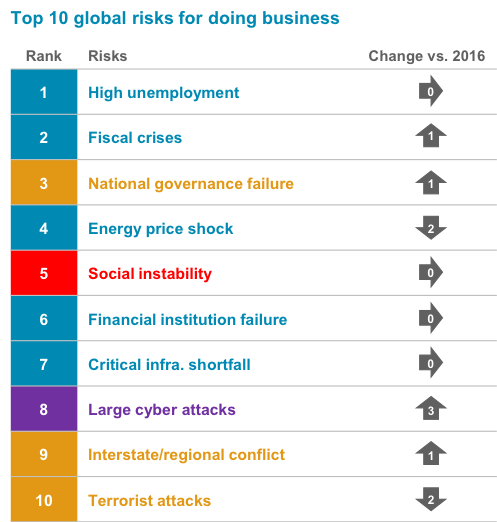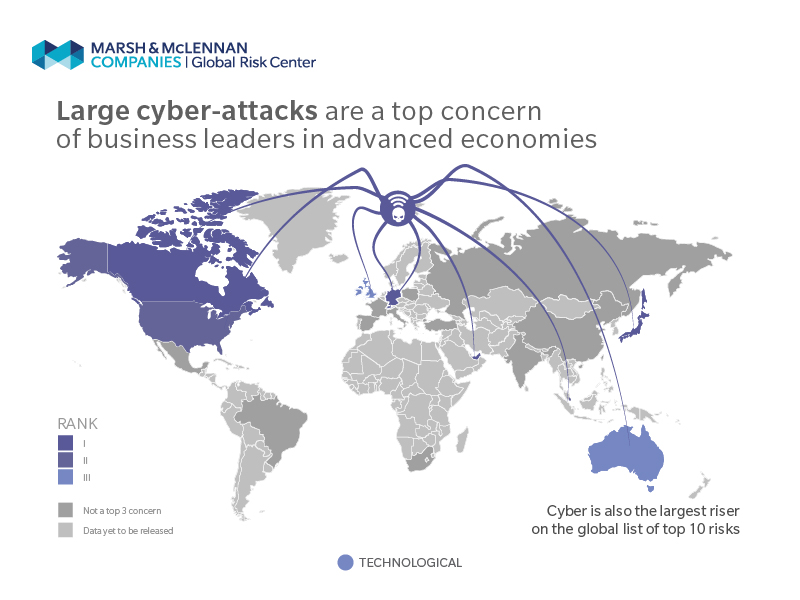Politics and Cyber are Rising Concerns for Business Leaders

People hold 'Esteladas' (Catalan pro-independence flags) in protest against a search for propaganda supporting Catalonia's independence referendum by the Spanish Guardia Civil on September 19, 2017. The search comes amid mounting tensions as Catalan leaders press ahead with preparations for an independence referendum on October 1 despite Madrid's ban and a court ruling that deems it illegal.
Photo: Lluis Gene/AFP/Getty Images
Business leaders are signaling rising concern about noneconomic risks, according to a global survey of business leaders. The results show a significant change from previous years, as executives reflect on the potential reverberations of sociopolitical and technological change.
The findings stem from the World Economic Forum’s 2017 Executive Opinion Survey, an exclusive poll in which 12,400 executives across 136 countries identified the global risks of highest concern for doing business in their country.
Three Smouldering Platforms
In a year of bullish talk about economic recovery and business confidence, unemployment and potential fiscal crises rank as the top-two concerns worldwide, revealing an underlying wariness about national growth strategies and the sustainability of investment.
Unemployment came out as the top concern in Europe, South Asia and sub-Saharan Africa, in second place in Latin America, and in third place in the Middle East and North Africa (MENA). Fiscal crises were the main concern in Eurasia and MENA and ranked in the top five in all other regions.
After 12 months of electoral surprises, governments struggling to deliver on economic growth agendas, increasingly authoritarian leadership, fresh corruption scandals and impeachment proceedings, it is perhaps no surprise to see national governance failures and social instability in the top-five concerns among all regions. This high ranking is all the more significant against the backdrop of the top-two risks, suggesting concern about a burgeoning nexus of sociopolitical volatility with scope for economic disruption.
National governance concerns have risen slightly in the rankings (especially in advanced economies), continuing to rank first in Latin America, rising to second position in Europe and South Asia, and remaining third in sub-Saharan Africa. While social instability only made the top five in Latin America and Eurasia, its pervasiveness in country top 10s helped it secure a higher global ranking.
The well-publicized growth in multi-regional, cross-industry cyberattacks by organized criminal groups and state-affiliated attacks on critical infrastructure and government assets most likely lie behind them being the largest riser among the global top-ten concerns. This threat ranked as the highest concern in North America and East Asia, and in the top five in Europe; in the latter two regions it showed a significant leap in positioning since last year’s survey.
The one risk in the top five that has gone down as a concern is energy price shock. It remains high in regions such as MENA, sub-Saharan Africa, Eurasia and East Asia, but even for key oil exporting countries in those and other regions, the challenges posed by low prices have been superseded by other concerns.
Sub-Regional and Country Variants
Inevitably the global and regional data masks variations in perceptions between countries. Business leaders in European countries such as Germany, the UK and Switzerland express high concern about malicious actors in the form of cyber and terrorist attacks. (This is mirrored across the Atlantic in the U.S.) Executives in European countries such as France, Spain and Italy rank national governance failures, unemployment and social instability among the top global risks. (This is mirrored across the Atlantic in countries such as Brazil and Mexico.) On the eastern and southern margins of Europe, the examples of Poland, Russia and Turkey show high concern about fiscal crises and interstate conflict.
For business leaders in the U.S., three of the top-five concerns are technology related: large cyberattacks, the misuse of technology, and data fraud or theft. While Canadian executives share the concern about large cyberattacks, their top five is filled out by macroeconomic and environmental concerns.
Looking across the Asia and Pacific region, concern about possible fiscal crises is high in Russia, India and Japan, while the risk of asset bubbles is more acutely felt in Singapore and Australia. Cyber threat is perceived as the standout in East Asia, ranking top in Japan, second in Singapore, third in Australia and fifth in China (where it ranked outside the top ten in last year’s survey). Executives in Singapore, India and Japan share a concern about terrorism, while the threats posed by natural catastrophes are high on the radar of business leaders in China and Japan.
Broader comparisons are occasionally instructive. Executives in the United Arab Emirates have very similar concerns as their counterparts in Singapore. Likewise, the list of top-five global risks for business leaders in Brazil is almost the same as that for South Africa. While neither of these cross-regional comparisons seems particularly surprising, a shortage of other strong examples in the current data release is a reminder of the distinct positioning of each country and its business sector in the global risks landscape.
Marsh McLennan is a strategic partner of the World Economic Forum on the global risks agenda. Additional details and country-specific results from the WEF’s Executive Opinion Survey can be found here.








